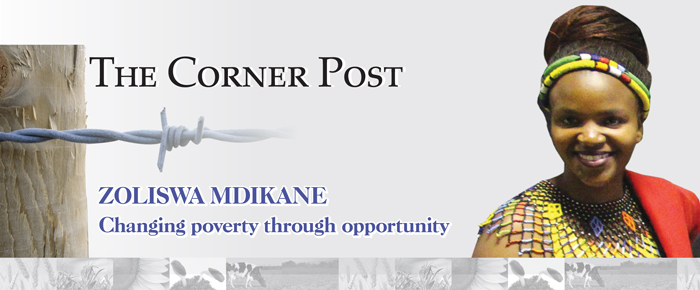December 2018

Being raised by unemployed parents led Zoliswa Mdikane (25) to her decision to study agriculture. Zoliswa hails from a deeply rural area, Tshisane, near the town Tsolo in the Eastern Cape, which is approximately 40 km from Mthatha.
‘In the Eastern Cape our gold is in the soil – planting is how we can make a living without being employed,’ she shares about the important role agriculture plays in this region. The area consists mostly of subsistence farmers who farm with maize, vegetables and domestic livestock for own consumption.
Applied knowledge is power
Zoliswa realised that to make a difference to poverty in the area where she was raised, she had to increase her limited knowledge about agriculture. ‘The poverty is immense in this area and I knew that if I were to study agriculture I would be able to create employment without having to rely on others to employ me.’
She obtained a diploma in animal production at Fort Cox College of Agriculture and Forestry in Middledrift in 2014. Unfortunately, she was one of the many who discovered that a diploma or degree does not guarantee a job or an income. This determined young lady was however not deterred when she couldn’t find a job. She joined a group of the farmers who had started planting maize. This decision eventually led to her path crossing with that of Grain SA provincial co-ordinator in Mthatha, Sinelizwi Fakade, an interaction which had an immense impact in her life.
In September 2017 Zoliswa received an amazing opportunity to be part of the first group of graduates to participate in the Grain SA Internship Programme where she would receive training to become a junior mentor. This programme is a joined partnership between Grain SA and the Department of Rural Development and Agrarian Reform (DRDAR).
Through the programme the interns can obtain much needed experience in the field, better equipping them for their future careers. On the other hand, Grain SA Farmer Development is given the opportunity to train the calibre of mentors needed in the field for future farmer development in the deep rural areas, like the one from which Zoliswa hails.
During the internship Zoliswa had to attend a variety of Grain SA farmer training courses in grain production with the other participants. These courses have a good balance between theory and the practical application thereof and form an integral part of the internship.
The three areas where she found the most benefit are:
Putting knowledge into practice
According to an English philosopher, Herbert Spencer, the great aim of education is not knowledge, but action. After the completion of the internship Zoliswa passed her written exam with flying colours and could now take her first step as a working individual.
With the necessary tools in hand she couldn’t wait to spring into action and currently oversees four study groups on a weekly basis. Presently they are busy with input deliveries, giving lectures on basic maize production, the different growth stages of maize and the importance of soil preparation.
Although the farmers were doubtful of this young lady initially, her knowledge about agriculture impressed them and she was quickly accepted by the 99 Xhosa speaking farmers. ‘It is difficult for a woman and youngster to be accepted in this field, but once the farmers saw that I knew what I was talking about I was easily accepted.’
Zoliswa is intensely grateful to Grain SA, Sinelizwe and the DRDAR for this wonderful opportunity. She feels it would be such a wonderful achievement if this programme was to expand into more regions of the Eastern Cape, creating more employment opportunities for youngsters as they get exposed to agricultural knowledge. They can either transfer the knowledge or even become farmers themselves. ‘As a country suffering from unemployment and hunger, it will be wonderful for others to be equipped with this information. This will ultimately be a key factor in fighting poverty,’ she says.
This month’s edition of The Corner Postwas written by Louise Kunz, Pula Imvula contributor. For more information, send an email to louise@infoworks.biz.
Publication: December 2018
Section: Pula/Imvula